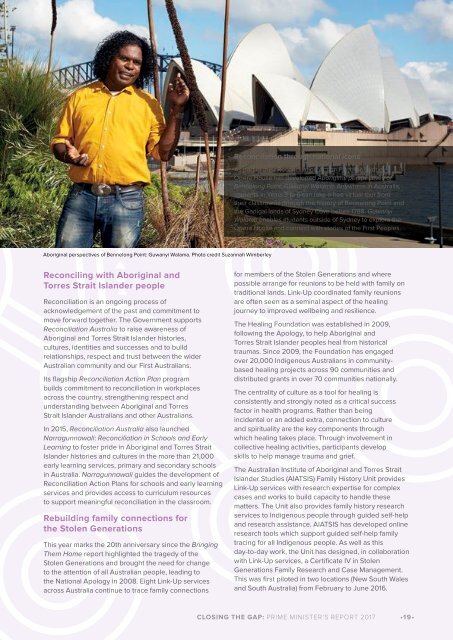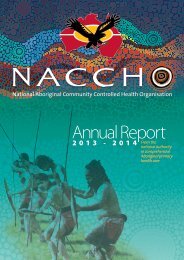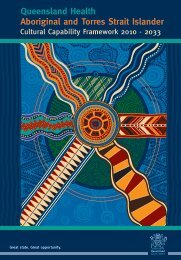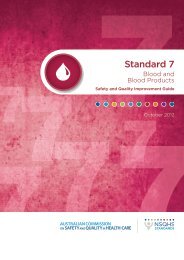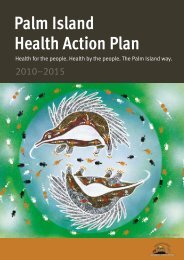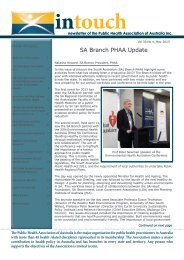CLOSING THE GAP
ctg-report-2017
ctg-report-2017
You also want an ePaper? Increase the reach of your titles
YUMPU automatically turns print PDFs into web optimized ePapers that Google loves.
Reconciliation through national icons<br />
As part of their Reconciliation Action Plan, the Sydney<br />
Opera House has developed Aboriginal perspectives of<br />
Bennelong Point: Guwanyi Walama. Anywhere in Australia,<br />
students in Years 3 to 6 can take a free virtual tour from<br />
their classrooms through the history of Bennelong Point and<br />
the Gadigal lands of Sydney Cove before 1788. Guwanyi<br />
Walama enables students outside of Sydney to explore the<br />
Opera House and connect with stories of the First Peoples.<br />
Aboriginal perspectives of Bennelong Point: Guwanyi Walama. Photo credit Suzannah Wimberley<br />
Reconciling with Aboriginal and<br />
Torres Strait Islander people<br />
Reconciliation is an ongoing process of<br />
acknowledgement of the past and commitment to<br />
move forward together. The Government supports<br />
Reconciliation Australia to raise awareness of<br />
Aboriginal and Torres Strait Islander histories,<br />
cultures, identities and successes and to build<br />
relationships, respect and trust between the wider<br />
Australian community and our First Australians.<br />
Its flagship Reconciliation Action Plan program<br />
builds commitment to reconciliation in workplaces<br />
across the country, strengthening respect and<br />
understanding between Aboriginal and Torres<br />
Strait Islander Australians and other Australians.<br />
In 2015, Reconciliation Australia also launched<br />
Narragunnawali: Reconciliation in Schools and Early<br />
Learning to foster pride in Aboriginal and Torres Strait<br />
Islander histories and cultures in the more than 21,000<br />
early learning services, primary and secondary schools<br />
in Australia. Narragunnawali guides the development of<br />
Reconciliation Action Plans for schools and early learning<br />
services and provides access to curriculum resources<br />
to support meaningful reconciliation in the classroom.<br />
Rebuilding family connections for<br />
the Stolen Generations<br />
This year marks the 20th anniversary since the Bringing<br />
Them Home report highlighted the tragedy of the<br />
Stolen Generations and brought the need for change<br />
to the attention of all Australian people, leading to<br />
the National Apology in 2008. Eight Link-Up services<br />
across Australia continue to trace family connections<br />
for members of the Stolen Generations and where<br />
possible arrange for reunions to be held with family on<br />
traditional lands. Link-Up coordinated family reunions<br />
are often seen as a seminal aspect of the healing<br />
journey to improved wellbeing and resilience.<br />
The Healing Foundation was established in 2009,<br />
following the Apology, to help Aboriginal and<br />
Torres Strait Islander peoples heal from historical<br />
traumas. Since 2009, the Foundation has engaged<br />
over 20,000 Indigenous Australians in communitybased<br />
healing projects across 90 communities and<br />
distributed grants in over 70 communities nationally.<br />
The centrality of culture as a tool for healing is<br />
consistently and strongly noted as a critical success<br />
factor in health programs. Rather than being<br />
incidental or an added extra, connection to culture<br />
and spirituality are the key components through<br />
which healing takes place. Through involvement in<br />
collective healing activities, participants develop<br />
skills to help manage trauma and grief.<br />
The Australian Institute of Aboriginal and Torres Strait<br />
Islander Studies (AIATSIS) Family History Unit provides<br />
Link-Up services with research expertise for complex<br />
cases and works to build capacity to handle these<br />
matters. The Unit also provides family history research<br />
services to Indigenous people through guided self-help<br />
and research assistance. AIATSIS has developed online<br />
research tools which support guided self-help family<br />
tracing for all Indigenous people. As well as this<br />
day-to-day work, the Unit has designed, in collaboration<br />
with Link-Up services, a Certificate IV in Stolen<br />
Generations Family Research and Case Management.<br />
This was first piloted in two locations (New South Wales<br />
and South Australia) from February to June 2016.<br />
<strong>CLOSING</strong> <strong>THE</strong> <strong>GAP</strong>: PRIME MINISTER'S REPORT 2017<br />
•19•


